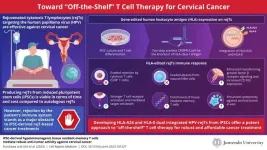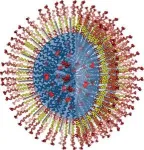Cervical cancer is among the most common malignancies affecting women worldwide. In 2020 alone, approximately 600,000 women were diagnosed with this disease, and over 314,000 died from it. In 99% of the cases, cervical cancer cells harbor human papilloma virus (HPV), and thus, HPV vaccines are an effective way to mitigate the risk of developing this disease. Unfortunately, such preventive measures are useless against established cancers, which are generally incurable once they become metastatic or relapsing.
Fortunately, scientists have made substantial progress in developing a promising therapeutic strategy for cervical cancer: rejuvenated cytotoxic T lymphocytes (rejTs). These lymphocytes can be engineered to target HPV-specific antigens that are expressed predominantly in cervical cancer cells, constituting a type of targeted immunotherapy. Ideally, rejTs would be produced from induced pluripotent stem cells (iPSCs) gathered from the patient themselves. However, this process is not clinically feasible in terms of both time and cost.
Against this backdrop, a research team including Chief Professor Miki Ando, graduate student Yoshiki Furukawa, and Assistant Professor Midori Ishii from Juntendo University School of Medicine, Japan, has recently achieved a breakthrough by developing robust iPSC-derived rejTs for cervical cancer treatment. Their work was published online on December 12, 2023, in Cell Reports Medicine.
The team sought to address one of the key roadblocks for allogeneic iPSC-derived rejTs, which refers to rejTs produced from ‘standardized’ iPSCs rather than derived from the patient’s cells. Prof. Ando explains, “In immunocompetent cervical cancer patients, the dominant problem is the rejection of foreign T lymphocytes by the recipient’s CD8+ T lymphocytes or natural killer (NK) cells.” The patient’s immune system tends to attack the therapeutic HPV-specific rejTs before they can neutralize cancer cells.
To overcome this issue, the research team used CRISPR-Cas9 two-step “scarless” gene editing on iPSCs derived from an HPV-specific cytotoxic T lymphocyte clone. The first modification was the deletion of all HLA class I antigens from the cells. The role of these surface protein is to present peptides to CD8+ T lymphocytes, which promptly eliminate any cells displaying foreign or anomalous peptides. After the modification, the cells are essentially able to evade detection by CD8+ T lymphocytes.
The second modification involved introducing the limited expression of two specific HLA antigens, namely HLA-A24 and HLA-E. This enabled the engineered cells to evade attacks from NK cells, which specifically target cells lacking these surface antigens. By selecting HLA-A24, the engineered cells are naturally compatible with a significant portion of South American, Eastern Asian, North American, and European populations.
After implementing these modifications using CRISPR-Cas9, the researchers induced the differentiation of the iPSCs into T lymphocytes and tested their ability to fight cervical cancer cells while evading allogeneic immune responses both in vitro and in vivo. These experiments yielded very promising results, as the generated rejTs did not trigger attacks from either CD8+ T cells or NK cells while simultaneously achieving strong cytotoxicity against tumor cells.
Compared to the control group, mice engrafted with cervical cancer cells and injected with the gene-edited rejTs survived longer and exhibited significantly reduced tumor sizes and proliferation index. To gain further insights into the enhanced therapeutic effects of the rejTs, the researchers conducted single-cell RNA sequencing analyses. These analyses revealed that the population of rejTs was highly enriched with tissue resident memory T cells, which establish residence in the mucosa of the cervix and provide stronger protection. Prof. Ando remarks, “We found that the enhanced cytotoxicity against cervical cancer occurred through TGFβ signaling and increased CD103 expression.”
Taken together, the results of this study showcase a powerful method to make iPSC-derived rejTs a viable option to treat one of the most common forms of cancer. Prof Ando concludes, “The HLA-engineered HPV-rejTs obtained using our method provide a sustainable and promising approach toward successful ‘off-the-shelf’ T cell therapy, which could help in overcoming cervical cancer. We are planning on conducting an investigator-initiated clinical trial in 2024.”
Reference
Authors
Yoshiki Furukawaa, Midori Ishiia, Jun Andoa,b, Kazuya Ikedac, Kyomi J. Igarashid, Shintaro Kinoshitaa, Yoko Azusawab,
Tokuko Toyotaa, Tadahiro Hondaa, Mahito Nakanishie, Koichi Ohshimaf, Ayako Masudag, Emiko Yoshidag, Mari Kitadeg,
Matthew Porteusc, Yasuhisa Teraog, Hiromitsu Nakauchid, and Miki Andoa
Title of original paper
iPSC-derived hypoimmunogenic tissue resident memory T cells mediate robust anti-tumor activity against cervical cancer
Journal
Cell Reports Medicine
DOI
10.1016/j.xcrm.2023.101327
Affiliations
aDepartment of Hematology, Juntendo University School of Medicine
bDivision of Cell Therapy & Blood Transfusion Medicine, Juntendo University School of Medicine
cDepartment of Pediatrics, School of Medicine, Stanford University
dInstitute for Stem Cell Biology and Regenerative Medicine, Stanford University School of Medicine
eTOKIWA-Bio, Inc., Tsukuba Center Inc. (TCI)
fDepartment of Pathology, School of Medicine, Kurume University
gDepartment of Obstetrics and Gynecology, Juntendo University School of Medicine
About Professor Miki Ando from Juntendo University
Dr. Miki Ando is a certified hematologist with over twenty years of experience in research and patient care. She obtained her Ph.D. in 2005 from Juntendo University, where she currently serves as Chairperson of the Department of Hematology. Her most recent work focuses on stem cell regulation, iPSCs, and their potential for cancer therapy. She has published over 60 papers on these topics and has been cited numerous times.
END



